Do you ever feel like your automobile is underperforming despite routine maintenance?
Possibly a clogged PCV valve. Clogged PCV valves can cause engine issues that compromise performance and fuel economy.
We’ll list some of the signs of a clogged PCV valve in this blog post so you can fix your car. So, buckle up and let’s dive into the world of PCV valves.
Clogged PCV Valve Symptoms
The most common signs of a clogged PCV valve include an illuminated check engine light, engine misfires or a rough idle, oil leaks, excessive oil consumption, poor acceleration, and decreased fuel efficiency.
Other symptoms may include a strong smell of oil or burning plastic and increased engine noise. If left untreated, a clogged PCV valve could lead to damage to engine components and decrease the overall performance of the vehicle.
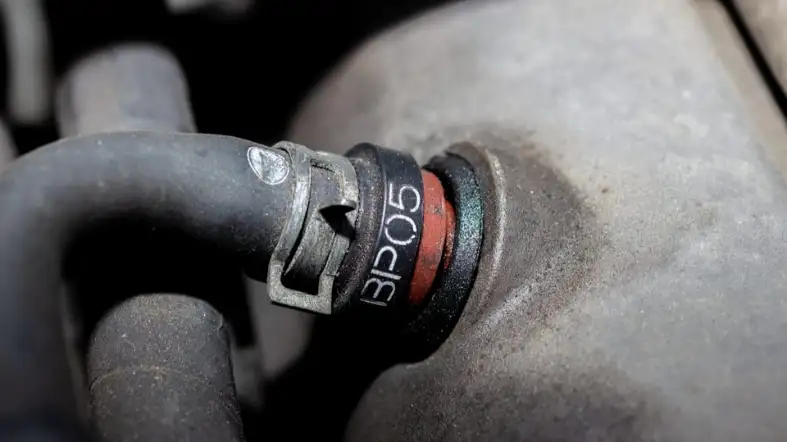
Common Signs Of A Clogged PCV Valve
Check engine light:
The check engine light is one of the most common signs of a clogged PCV valve. The engine light indicates a fault code in the engine control module.
OBD2 scanners read engine control unit fault codes.
Increased Oil Consumption
Clogged PCV valves increase engine pressure and oil consumption. The oil may be burned off faster than usual or utilized to lube PCV-lubricated parts.
Decreased Fuel Efficiency
Clogged PCV valves can create engine air-fuel mixture imbalances, reducing fuel efficiency.
Your engine may be working more than necessary to maintain performance, increasing fuel consumption.
Oil Leaks
A clogged PCV valve can cause oil leaks in your engine.
The pressure inside the engine can build up and find other ways to escape, which can cause oil to leak from various parts of the engine.
This can result in oil leaking from the valve cover, oil pan, or other areas.
Strange noises:
A failed PCV valve may whine, moan, or whistle. Blocking the vacuum supply to the valve and listening for changes can determine the noise source.
Certain vehicles’ PCV valves leak oil onto the air filter element.
Increased engine noise:
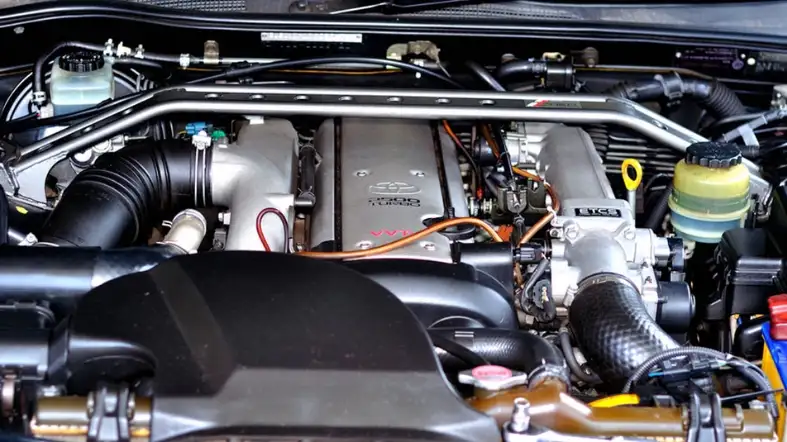
A clogged PCV valve can also cause an increase in engine noise. Engine ticking or knocking may signal a problem. Increased engine pressure can accelerate wear.
Rough idle:
A clogged PCV valve can also lead to a rough idle. At a red light or in traffic, your engine may shake or vibrate.
This might be uncomfortable and indicate engine trouble.
Poor acceleration:
If your engine is not able to regulate the air and fuel mixture properly due to a clogged PCV valve, it can result in poor acceleration.
You may notice that your vehicle is sluggish or slow to respond when you press the gas pedal.
Smoke from the exhaust:
Clogged PCV valves can create exhaust smoke. Oil pouring into the combustion chamber might damage your engine if not remedied.
Engine stalls at idle:
When the PCV valve is clogged, it can cause the engine to stall when idling.
The engine shuts off because it doesn’t have enough air to idle. A mechanic should inspect an idle-stalling engine.
What Causes A PCV Valve To Get Clogged?
Here are the causes of a a pcv valve to get clogged
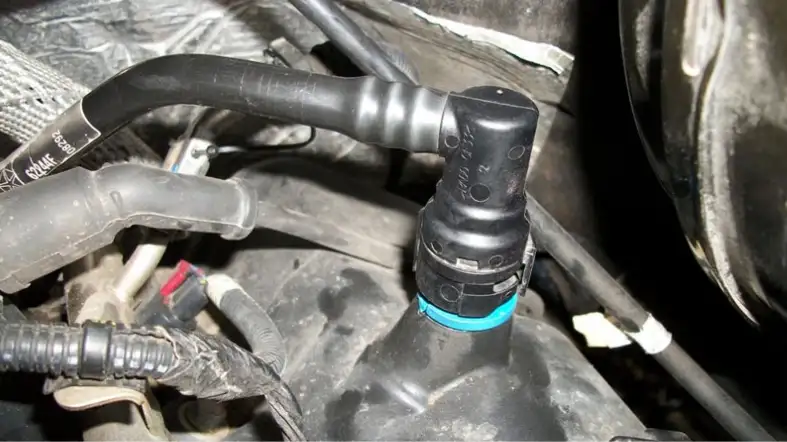
Oil and dirt buildup:
Over time, the PCV valve can accumulate dirt and oil buildup, which can cause it to clog and stop working properly.
When this happens, the valve may not be able to properly regulate the flow of air and gases in the engine.
Cold weather:
If you live in an area with cold weather, the PCV valve can get clogged due to condensation that freezes inside the valve.
This can prevent it from working properly and cause issues with your engine.
Carbon buildup:
The PCV valve can also get clogged due to carbon buildup, which can occur if the engine is not properly maintained.
This can cause the valve to stop working properly and lead to engine issues.
Age and wear:
Over time, the PCV valve can simply wear out and stop working properly.
This is more likely to happen if the valve is not properly maintained or if it is exposed to extreme temperatures and pressures.
Incorrect installation:
If the PCV valve is not properly installed, it can become clogged or not function properly.
This is why it’s important to always follow the manufacturer’s instructions when installing a new PCV valve.
Contaminants in engine oil:
If the engine oil is contaminated with dirt or other debris, it can cause the PCV valve to become clogged.
This can prevent the valve from regulating the flow of air and gases in the engine, leading to engine issues.
Faulty valve design:
In some cases, the PCV valve may be designed in a way that makes it more prone to clogging. This can be due to poor engineering or manufacturing.
Broken valve components:
If any components of the PCV valve become broken or damaged, it can cause the valve to clog or malfunction.
This is why it’s important to inspect the valve regularly and replace any damaged components.
Low-quality oil:
If you use low-quality engine oil, it can cause the PCV valve to become clogged over time.
This is because the oil may contain contaminants that can build up inside the valve and prevent it from working properly.
Vacuum leaks:
A vacuum leak in the engine can cause the PCV valve to malfunction or become clogged.
This is because the valve relies on proper vacuum pressure to function properly.
Internal Engine Problems:
Certain engine problems, such as worn piston rings, can cause excessive blow-by gases to enter the crankcase.
This can lead to a buildup of pressure and cause the PCV valve to clog.
It’s important to address any internal engine problems promptly to prevent damage to other engine components.
How To Diagnose A Clogged PCV Valve?
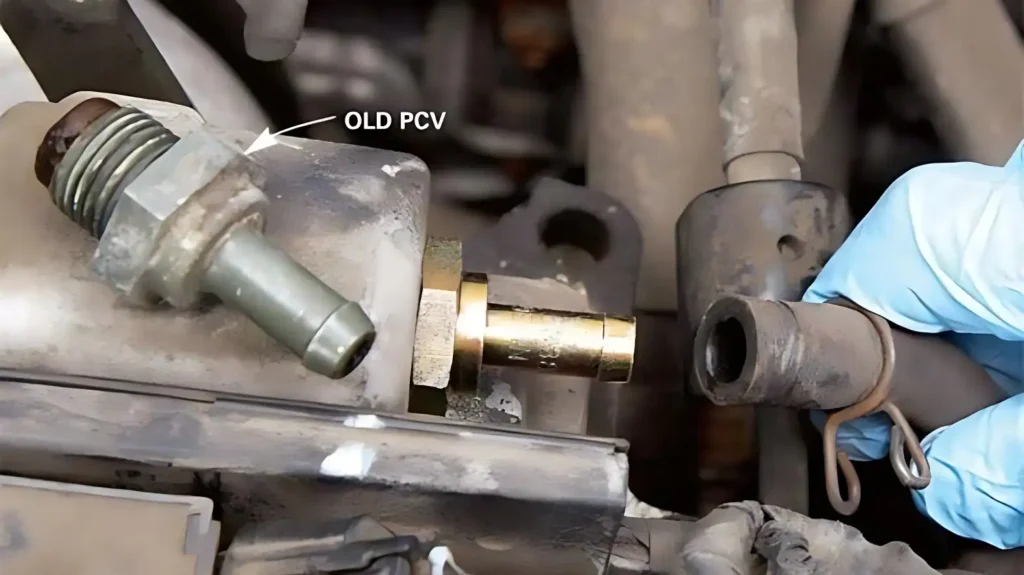
Here are some steps to diagnose a clogged PCV valve:
Listen for unusual noises
A common symptom of a clogged PCV valve is a whining, moaning, or whistling sound coming from your engine.
You can listen for these noises while your engine is idling, and if you hear anything unusual, it may be a sign that your PCV valve is clogged.
Look for oil leaks
A clogged PCV valve can cause oil to leak from your engine, which can be a sign of a more serious problem.
Look for oil spots under your vehicle, or for oil leaking from your engine.
Check for smoke
Another sign of a clogged PCV valve is excessive smoke coming from your vehicle’s exhaust.
If you see white, black, or blue smoke coming from your exhaust, it may be a sign that your PCV valve is clogged.
Perform a PCV valve test
To diagnose a clogged PCV valve, you can perform a PCV valve test.
This involves removing the PCV valve from your engine and inspecting it for clogs or damage.
You can also blow into the valve to see if air passes through easily, which is an indication that it’s not clogged.
Inspect the PCV valve hoses
The PCV valve hoses can also become clogged or damaged, which can lead to a clogged PCV valve. Inspect the hoses for cracks, leaks, or other signs of damage, and replace them if necessary.
How To Clean Or Replace A Clogged PCV Valve?
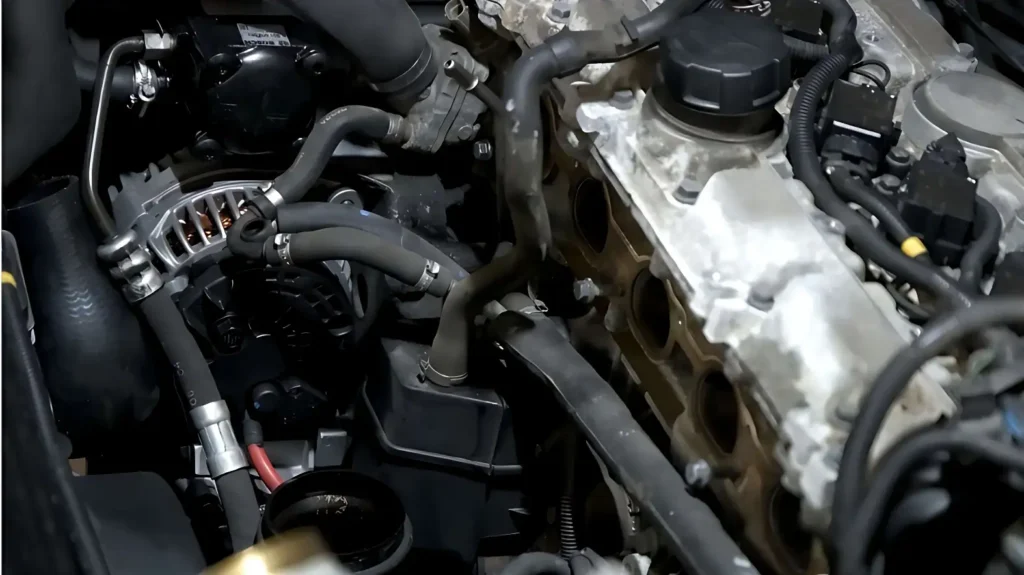
Here is how to clean or replace a clogged PCV Valve
Locate the PCV valve:
The PCV valve is usually located on the valve cover or the engine intake manifold. Refer to your vehicle owner’s manual or search for a diagram online to locate the valve.
Remove the PCV valve:
Remove the PCV valve with a wrench or pliers, depending on its location. Some valves are simply pressed into a rubber grommet, while others are threaded into the engine.
Inspect the valve:
Check the valve for any signs of damage or wear. Shake it to see if it rattles.
If the valve is dirty or clogged, it can be cleaned with carb cleaner or brake cleaner. However, if it is damaged or not rattling, it needs to be replaced.
Replace the valve:
Install a new PCV valve by reversing the removal process. Make sure to use the correct valve for your vehicle make and model.
If you are not sure which valve to use, consult with a mechanic or refer to the owner’s manual.
Check the hoses:
While you have the PCV valve removed, inspect the hoses and connections for any signs of damage or wear. Replace any damaged hoses and secure all connections.
Test the valve:
Once the valve is installed, test it to make sure it is working properly.
One way to check is to remove the cap from the oil filler hole on the valve cover and place a stiff piece of paper over the opening.
The valve should pull the paper against the hole in seconds.
FAQs
What Is A PCV Valve And What Does It Do?
A PCV (Positive Crankcase Ventilation) valve is an important component of an engine’s emissions control system.
It regulates the flow of gases and pressure in the crankcase by allowing the engine to draw in fresh air and release blowby gases.
How Can I Tell If My PCV Valve Is Clogged?
There are several symptoms of a clogged PCV valve, including increased engine pressure, oil leaks, poor fuel economy, rough idle, and smoke from the exhaust pipe.
What Causes A PCV Valve To Become Clogged?
A PCV valve can become clogged due to excessive oil consumption, buildup of debris and contaminants, or a faulty or worn-out valve.
How Often Should I Replace My PCV Valve?
The replacement interval for a PCV valve varies depending on the make and model of the vehicle, but it is generally recommended to replace it every 50,000 miles.
How Much Does It Cost To Replace A PCV Valve?
The cost of replacing a PCV valve varies depending on the make and model of the vehicle and the labor costs at your local repair shop. It averages $50–150.
Conclusion
If you’re experiencing any of the symptoms we discussed earlier, such as decreased fuel economy, rough idling, or engine misfires, it’s possible that your PCV valve is clogged.
To avoid engine damage, don’t ignore these warning indicators.
By checking your PCV valve regularly and replacing it when necessary, you can keep your engine running smoothly.
If you see any of these symptoms, take steps to keep your car running well.
